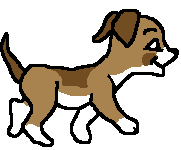From Puppy to Adolescent
- Faith
- Oct 31, 2021
- 3 min read
Updated: Mar 13, 2022
Just when you think that you & your puppy have mastered all the basics like toilet training, recall & socialisation, your cute & well-behaved puppy begins to experience lots of hormonal changes. This development stage in your puppy’s life means they are approaching adolescence which can affect dogs in different ways – some may temporarily go ‘off the rails’ & others could become more anxious in certain situations.
It is best to be well prepared for a few challenges along the way – it won’t last forever & more than anything, your young dog will need your patience & support during this time.

When does adolescence start and how long does it last?
Canine adolescence starts around 5 to 6 months of age when your puppy reaches sexual maturity. It usually ends around 18 months to 2 years when your dog reaches social maturity. Smaller breeds tend to hit their teenage phase earlier than larger breeds who develop more slowly.
Why is my teenage dog suddenly scared or reactive to other dogs/people?
Dogs experience a ‘fear period’ that happens between 6-18 months of age. Sometimes this just happens once but in other dogs it can happen several times which may coincide with growth spurts or hormone surges. Your puppy could suddenly become reactive or scared of things that have been ok in the past; people, dogs, unfamiliar objects or places etc.
Why is my dog not listening & behaving differently during the adolescent period?
Your dog is starting to look at the world as an adult rather than relying on you for security. This can often mean that they wander further from you when on walks & be less likely to listen when you call (despite how good their recall was before!). Some will even run off or actively avoid you when you call them. They are also likely to be more exuberant & boisterous.
Bear in mind, that there is a lot going on in the teenage dog’s mind & body at this time & just like a human teenager, adolescent dogs can be frustrating & sometimes difficult to live with.
Managing this period properly is important as a bad experience during this time could have a lasting effect on your dog’s behaviour even if all their previous interactions have been positive.
Top tips for getting through the teen puppy stage
Go back to general obedience training & include treat rewards. Lots of patience required if they are not so focused as before or seem to have forgotten everything they ever learned.
Revisit recall training - this could mean going back to using a long-line for a while, so your dog still gets freedom to run, sniff & explore but isn’t able to ignore you or go too far away.
Keep all social interactions positive & try to avoid encounters with antisocial or aggressive dogs as this is a time when these could shape the way your adult dog interacts with those around them.
Only let your dog play with dogs they know & get on well with.
Be prepared for your dog to be worried or fearful around things or situations they took in their stride in the past. They are reassessing everything through the eyes of an adult so be just as sensitive to these fears as you were when they were a puppy.
While sometimes it is easy to think that your adolescent dog is intentionally trying your patience, try to understand that this is a complex developmental stage for your dog. With a bit of teamwork, you will get through it together.
Contact Faith on 07941 640348 for any dog training or dog behaviour training.
#dogadolescence #puppytoteenager #dogtraining #generalobediencetraining #dogtrainingenfield #dogtrainingwinchmorehill #dogtrainingpalmersgreen #dogbehaviourtraining #forcefreedogtraining #lima





Comments